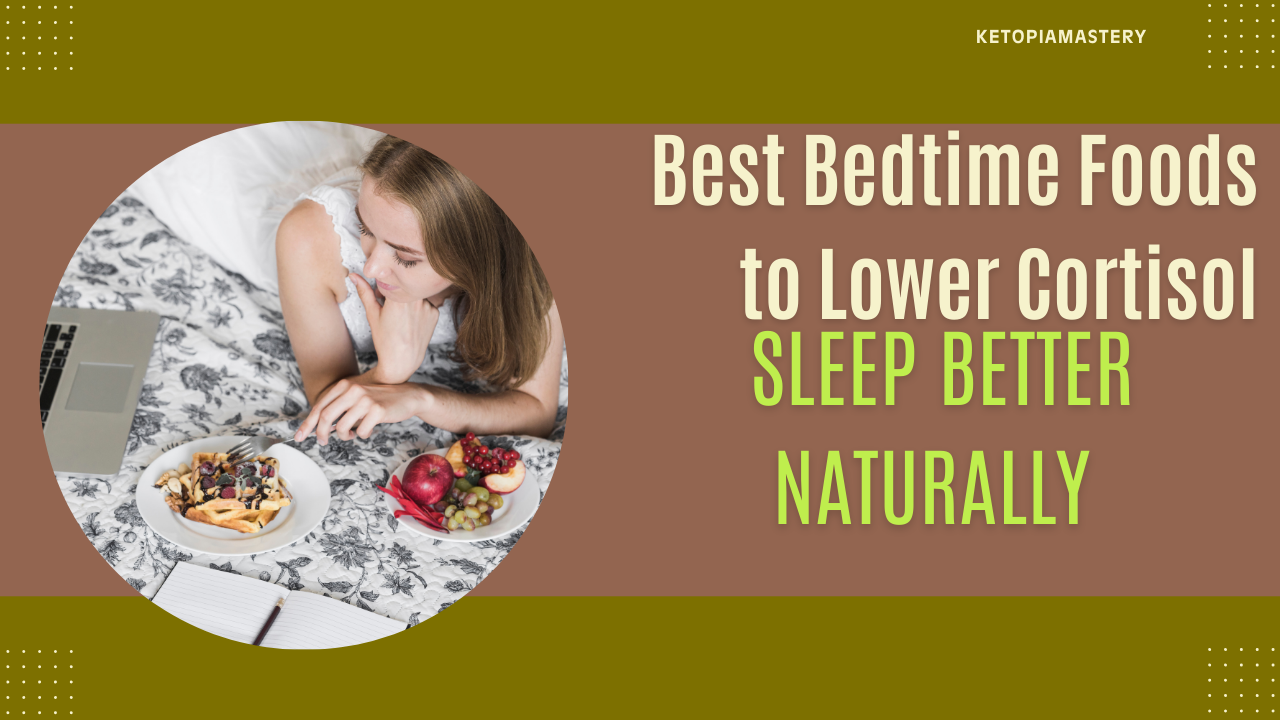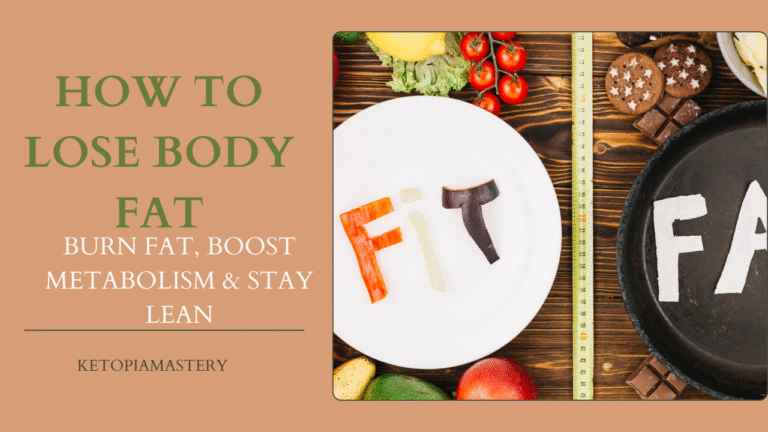Best Bedtime Foods to Lower Cortisol & Sleep Better Naturally
If you’ve ever gone to bed feeling wired, restless, or unable to calm your mind, chances are your cortisol levels are higher than they should be at night. Cortisol, often called the stress hormone, plays an essential role in regulating energy, metabolism, and the body’s natural sleep-wake cycle. Ideally, cortisol should be highest in the morning to help you wake up and gradually lower throughout the day, reaching its lowest point at night so your body can rest, recover, and repair.
But due to stress, poor diet, late-night screen use, or even blood sugar imbalances, many people struggle with high nighttime cortisol, leading to insomnia, belly fat storage, anxiety, and chronic fatigue. The good news? The food you eat before bed can play a powerful role in calming your nervous system, lowering cortisol, and improving sleep quality.

In this guide, we’ll explore:
What cortisol is and how it affects sleep
Why high nighttime cortisol is harmful
The best foods to eat before bed to naturally lower cortisol
Lifestyle tips to balance your stress hormones long-term
A sample bedtime snack plan for stress-free sleep
What Is Cortisol & Why Does It Rise at Night?
Cortisol is produced by your adrenal glands and regulated by the HPA axis (hypothalamic-pituitary-adrenal axis). Normally, cortisol follows a diurnal rhythm:
- Morning (6–8 AM): Peaks to wake you up
- Daytime: Helps you stay alert, energized, and focused
- Evening (8–10 PM): Drops to prepare your body for sleep
- Night: Stays low so melatonin (the sleep hormone) can do its job
When cortisol stays high at night, your body is essentially in “fight or flight” mode, making it difficult to relax. This is why you may feel tired but wired, tossing and turning even when exhausted.
Signs of High Nighttime Cortisol
If you regularly struggle with these symptoms, your cortisol rhythm may be off:
- Trouble falling or staying asleep
- Waking up between 2–4 AM
- Nighttime sugar or carb cravings
- Belly fat that’s hard to lose
- Racing thoughts or anxiety at bedtime
- Feeling unrefreshed even after a full night’s sleep
How Food Helps Lower Cortisol at Night
The right foods can help stabilize blood sugar, provide calming nutrients like magnesium and tryptophan, and trigger the release of serotonin and melatonin, the feel-good and sleep hormones. On the other hand, eating the wrong foods (sugary snacks, caffeine, alcohol) can spike cortisol and keep you restless all night.
Let’s dive into the best bedtime foods for lowering cortisol and improving sleep.

1. Warm Milk (or Dairy Alternatives with Tryptophan)
For centuries, warm milk has been a go-to bedtime drink—and science supports it. Milk is rich in tryptophan, an amino acid that helps your body produce serotonin and melatonin.
Why it works:
- Tryptophan → serotonin → melatonin = better sleep cycle
- Provides calcium, which supports melatonin production
- Warmth itself has a calming effect on the nervous system
Tip: If you’re lactose intolerant, try almond or oat milk fortified with calcium and magnesium.
2. Bananas
Bananas are a natural bedtime superfood. They’re rich in magnesium and potassium, which help relax muscles and nerves, while also containing tryptophan for melatonin support.
Why it works:
- Lowers muscle tension (great for stress-related tightness)
- Prevents midnight cramps
- Natural sweetness stabilizes cravings without spiking blood sugar
3. Almonds & Walnuts
Nuts are one of the best cortisol-balancing foods because they provide healthy fats, magnesium, and melatonin. Walnuts, in particular, are one of the few plant sources of melatonin.
Why it works:
- Magnesium lowers cortisol and calms the nervous system
- Healthy fats prevent nighttime blood sugar dips
- Melatonin directly supports sleep
Best option: A small handful (about 1 oz) before bed.
4. Tart Cherries
Tart cherries and tart cherry juice are among the most research-backed foods for better sleep. They naturally contain melatonin and antioxidants that lower inflammation and cortisol.
Why it works:
- Boosts natural melatonin levels
- Lowers oxidative stress (which can raise cortisol)
- Improves sleep duration and quality
5. Sweet Potatoes
Sweet potatoes are a slow-digesting carb that helps reduce cortisol by stabilizing blood sugar. Eating complex carbs at night supports the uptake of tryptophan into the brain.
Why it works:
- Provides steady energy so blood sugar doesn’t dip overnight
- Supports serotonin production
- Rich in potassium and magnesium for muscle relaxation
6. Leafy Greens (Spinach, Kale)
A small evening salad or sautéed greens can support cortisol balance thanks to their magnesium, folate, and vitamin C content—all nutrients that regulate stress hormones.
Why it works:
- Magnesium relaxes muscles
- Folate supports serotonin production
- Vitamin C lowers cortisol levels in stressful situations

7. Eggs
Eggs, especially the yolks, are rich in choline, vitamin D, and tryptophan. Eating a boiled egg or scrambled eggs before bed gives your body a steady dose of protein without spiking cortisol.
Why it works:
- Tryptophan promotes sleep hormones
- High-quality protein prevents nighttime hunger
- Nutrients like choline support brain relaxation
8. Oatmeal
Oats are a natural source of complex carbs, melatonin, and magnesium, making them a surprisingly effective bedtime snack.
Why it works:
- Increases serotonin and melatonin production
- Provides slow-release carbs to prevent nighttime cravings
- Comforting, warm, and filling
Tip: Add a sprinkle of cinnamon for blood sugar balance and a handful of berries for antioxidants.
Foods to Avoid Before Bed (Cortisol Spikers)
To truly lower cortisol, it’s just as important to avoid foods that spike stress hormones:
- Caffeine (coffee, tea, energy drinks, chocolate) – Stimulates cortisol release
- Alcohol – Initially sedating but disrupts sleep cycles and increases cortisol rebound
- Refined sugar & junk food – Spikes blood sugar → cortisol spike → crashes and cravings
- High-sodium foods – Can elevate blood pressure and stress response
Lifestyle Tips for Lowering Nighttime Cortisol
Food is powerful, but combining nutrition with lifestyle changes enhances results. Try these:
- Limit screens 1 hour before bed – Blue light suppresses melatonin.
- Practice relaxation techniques – Deep breathing, meditation, or journaling lowers stress hormones.
- Stick to a routine – Going to bed at the same time trains your body’s cortisol rhythm.
- Exercise earlier in the day – Evening workouts can spike cortisol in some people.
- Dim the lights – Darkness signals melatonin release.
Sample Bedtime Snack Plan for Lowering Cortisol
Here’s how you can put it all together into a stress-lowering nighttime routine:
- Option 1: Warm milk with cinnamon + a handful of walnuts
- Option 2: Oatmeal topped with banana slices and almonds
- Option 3: Tart cherry smoothie with Greek yogurt and spinach
- Option 4: Sweet potato mash + boiled egg on the side
- Option 5: Cucumber and kale salad + chamomile tea

FAQs About Nighttime Cortisol and Food
1. Can eating carbs at night lower cortisol?
Yes—slow-digesting carbs like oats, quinoa, or sweet potatoes help shuttle tryptophan into the brain, improving sleep and lowering cortisol.
2. Is intermittent fasting bad for nighttime cortisol?
For some, yes. Skipping dinner or fasting too long can increase cortisol at night due to blood sugar dips.
3. Should I eat protein before bed?
Yes. A light protein snack (like eggs or Greek yogurt) helps prevent cortisol-driven midnight awakenings.
4. Can supplements help lower cortisol?
Magnesium, ashwagandha, and L-theanine are effective, but food and lifestyle changes should be the foundation.
5. How long before bed should I eat?
Ideally, have your last snack 1–2 hours before sleep for best digestion and hormonal balance.
Final Thoughts
Lowering nighttime cortisol is one of the most important steps to improving your sleep, energy, and long-term health. By incorporating the right bedtime foods—like bananas, warm milk, almonds, tart cherries, and sweet potatoes—you can calm your nervous system, balance hormones, and finally enjoy restful, restorative sleep.
Remember, consistency is key. Pair these foods with a calming bedtime routine, and over time you’ll train your body to wind down naturally, wake up refreshed, and feel less stressed during the day.
Find more ideas: https://ketopiamastery.com/refreshing-cucumber-salads/https://ketopiamastery.com/crispy-cauliflower-bites-healthy-baked-air-fryer-snack-recipe/https://ketopiamastery.com/banana-blueberry-pancake-bites/https://ketopiamastery.com/creamy-chicken-and-broccoli-pasta-bake/https://ketopiamastery.com/baked-salmon-with-potatoes-and-asparagus/https://ketopiamastery.com/snack-board-lunch-ideas/







